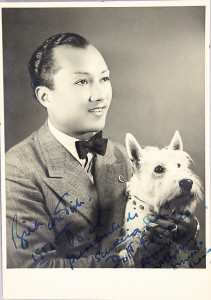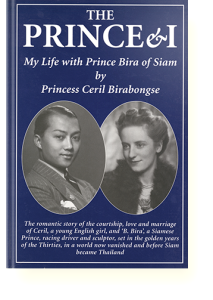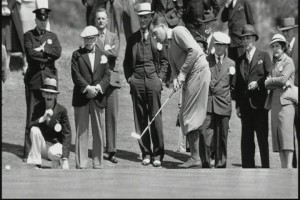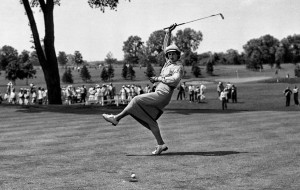With the World Cup going on, some people have wondered about the 3-letter hashtags (#USA or #GER) used on twitter for the various competing nations. The first time that national identifying abbreviations formally appeared at the Olympics was in 1952 at Helsinki. They were not used in the Official Report, but did appear in the Daily Programs from that year. The abbreviations were not strictly of the 3-letter style. A few had 4-letters (USSR, CHIN = China), while some had only 2-letters (Finland = SF, Saar = SR), and several had 2-letters separated by a dash (Czechoslovakia = T-S, Great Britain = G-B, Hong Kong = H-K, New Zealand = N-Z, Puerto Rico = P-R). They have varied greatly over the years – one can see the article on these in Journal of Olympic History (Mallon/Karlsson. “IOC and OCOG Abbreviations for NOCs”. Journal of Olympic History 12 (2): 25–28, May 2004.)
But FIFA (the football federation) and the IAAF (the athletics federation) also have their own set of 3-letter abbreviations (3LA) – and they are not always the same.
The only time this has really come up at the World Cup is with Nigeria, which has a 3LA of NGR from the IOC and the IAAF, but is NGA per FIFA.
There are 269 “countries” recognized by the 3 organizations, although many are not technically nations, and some 30 of them are now defunct. The IOC has had 232 different recognized geo-political entities (GPEs), and currently recognizes 204 National Olympic Committees (NOCs). FIFA has recognized 239 abbreviations, and currently recognizes 209 GPEs, while the IAAF has had 216 abbreviations, with 212 GPEs currently recognized. In addition, over the years, some nations change their IOC 3LA – such as Saudi Arabia, which used to be SAU, but is now KSA (=Kingdom of Saudi Arabia), and Iran, which was originally IRN by the IOC, but later changed to IRI = Islamic Republic of Iran. There are several other such examples – all noted in the article referenced above. The former Czechoslovakia alone had 8 different abbreviations used by varying Olympic Organizing Committees – T-S, CZS, CSL, CZE, CSV, CS, CZS, and TCH; and this does not include CZE and SVK after the nation split into Slovakia and the Czech Republic.
Currently, there are 198 GPEs recognized by the IOC, FIFA, and the IAAF. Of these 23 of them differ among the organizations. In 19 cases, the IOC and IAAF agree, but FIFA has a different 3LA, while in 4 cases, the IOC and FIFA agree but the IAAF has a different 3LA. There are also 5 cases of GPEs not recognized by all 3 organizations, but which have different 3LAs. The entire list is as follows:
[table]
NOC,IOC,FIFA,IAAF,Notes
Antigua & Barbuda,ANT,ATG,ANT,FIFA differs from IOC/IAAF
Bahrain,BRN,BHR,BRN,FIFA differs from IOC/IAAF
Barbados,BAR,BRB,BAR,FIFA differs from IOC/IAAF
Belize,BIZ,BLZ,BIZ,FIFA differs from IOC/IAAF
British Virgin Islands,IVB,VGB,IVB,FIFA differs from IOC/IAAF
Burkina Faso,BUR,BFA,BUR,FIFA differs from IOC/IAAF
Central African Republic,CAF,CTA,CAF,FIFA differs from IOC/IAAF
El Salvador,ESA,SLV,ESA,FIFA differs from IOC/IAAF
Equatorial Guinea,GEQ,EQG,GEQ,FIFA differs from IOC/IAAF
Guinea – Bissau,GBS,GNB,GBS,FIFA differs from IOC/IAAF
Indonesia,INA,IDN,INA,FIFA differs from IOC/IAAF
Iran,IRI,IRN,IRI,FIFA differs from IOC/IAAF
Latvia,LAT,LVA,LAT,FIFA differs from IOC/IAAF
Libya,LBA,LBY,LBA,FIFA differs from IOC/IAAF
Malawi,MAW,MWI,MAW,FIFA differs from IOC/IAAF
Nigeria,NGR,NGA,NGR,FIFA differs from IOC/IAAF
Palestine,PLE,PAL,PLE,FIFA differs from IOC/IAAF
Slovenia,SLO,SVN,SLO,FIFA differs from IOC/IAAF
United States Virgin Islands,ISV,VIR,ISV,FIFA differs from IOC/IAAF
,,,,
Congo DR (Zaire),COD,COD,ZAI,IAAF differs from IOC/FIFA
East Timor,TLS,TLS,ETM,IAAF differs from IOC/FIFA
Romania,ROU,ROU,ROM,IAAF differs from IOC/FIFA
Serbia,SRB,SRB,SER,IAAF differs from IOC/FIFA
,,,,
Anguilla,,AIA,ANG,IOC does not recognize
Faeroe Islands,,FRO,FAR,IOC does not recognize
Marshall Islands,MHL,,MSH,FIFA does not recognize
Montserrat,,MSR,MNT,IOC does not recognize
Turks & Caicos Islands,,TCA,TKS,IOC does not recognize
[/table]



